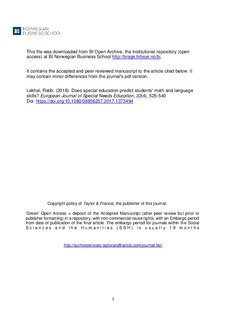Does special education predict students’ math and language skills?
Journal article, Peer reviewed
Accepted version
Permanent lenke
http://hdl.handle.net/11250/2505146Utgivelsesdato
2018Metadata
Vis full innførselSamlinger
- Publikasjoner fra CRIStin - BI [1015]
- Scientific articles [2181]
Originalversjon
European Journal of Special Needs Education, 2018, 33(4), 525-540 10.1080/08856257.2017.1373494Sammendrag
A large number of children are today receiving special education in Norway. The high cost to society and possible long-term consequences for the students make it important to understand the interrelationship of the causes and effects related to receiving special education services. Unfortunately, at present there are only few rigorous studies of the effects of receiving special education services. This study examined the interrelationship between receiving special education services and students’ math and language skills in upper secondary school in Norway. Data from 2756 students in the large population-based special education study (SPEED) was used that included information from questionnaires on students’ development, learning environment and family background. Results showed that students receiving special education services had slightly lower scores on their language test but similar scores on their math test compared to the group of students not receiving special education services, when conservative methodological approaches were used to control for possible covariate bias.
